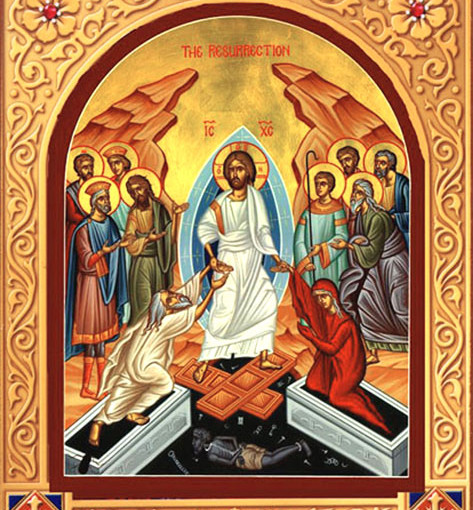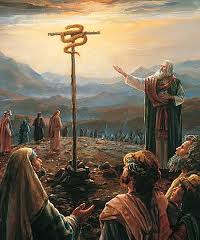We should glory in the Cross of our Lord Jesus Christ,
in whom is our salvation, life and resurrection,
through whom we are saved and delivered.
During this Triduum journey, I have been reflecting in my homilies on the Cross of our Lord Jesus Christ. I’ve talked about the fact that this is not a popular thing to do because we as a society are not big on suffering. If we put a sign out on Chicago Avenue that said, “Come suffer with us,” I’m pretty sure we’d be all alone here in church! We certainly do suffer in this life, but no one wants it – as well we shouldn’t. The problem is that we tend to gloss over it, not acknowledge it, be embarrassed by it. Suffering becomes the elephant in the room that no one wants to acknowledge, and that’s too bad, really.
Certainly it seems odd that I would continue to talk about the Cross on this holy night. I mean, we’ve moved on, haven’t we? We came here for resurrection and want to get on with our lives. Just like we tend to rush through our grieving of loved ones – to our own psychological and spiritual peril, by the way – so too we want to rush through our Lent and particularly our Good Friday and Holy Saturday, so that we can eat our Peeps and chocolate bunnies and call it a day.
But we can’t, right? If we’ve prayed well this Lent and particularly in these Triduum days, we know how we got here to this moment. We know that we don’t get an Easter Sunday without a Good Friday, that we can’t have resurrection if there hasn’t been death, that we can’t have salvation if there hasn’t been a sacrifice.
And there sure was a sacrifice. Our Lord suffered a brutal, ugly death between two hardened criminals, taking the place of a revolutionary. He was beaten, humiliated, mistreated and nails were pounded into his flesh, that flesh that he borrowed from us. He hung in agony for three hours and finally, when all was finished, he cried out in anguish and handed over his spirit. The veil of the temple was torn in two, there was a tremor in the earth, and an eclipse of the sun. And no wonder, the light of the Messiah had been extinguished on the Cross.
Placed in the tomb, he descended into hell. Collecting the souls of the blessed ones of old, he waited while earth mourned and disciples scattered and everyone wondered what happened to this Christ.
But then came the morning. The Sabbath was over, and the sun was rising in the east on the first day of the week, and the women came with spices to prepare our Lord for burial. But they couldn’t: he has been raised! He is not here! Our Lord is risen and death is defeated! The menacing, ugly Cross has become the altar of salvation! The instrument of horror has become the Cross of glory, and we can do no less than praise our God!
Saint John Damascene reflected on this salvific reality. He writes, “By nothing else except the Cross of our Lord Jesus Christ has death been brought low: The sin of our first parent destroyed, hell plundered, resurrection bestowed, the power given us to despise the things of this world, even death itself, the road back to the former blessedness made smooth, the gates of paradise opened, our nature seated at the right hand of God and we made children and heirs of God. By the cross all these things have been set aright…It is a seal that the destroyer may not strike us, a raising up of those who lie fallen, a support for those who stand, a staff for the infirm, a crook for the shepherded, a guide for the wandering, a perfecting of the advanced, salvation for soul and body, a deflector of all evils, a cause of all goods, a destruction of sin, a plant of resurrection, and a tree of eternal life.”
It’s so important that we enter into Lent and the Triduum every year. Not just because we need to be called back from our sinfulness to the path of life – yes, there is that, but it’s not primary here. What is so important is that we see that the Cross is our path too. In this life we will have trouble: our Savior promises us that. But the Cross is what sees him overcome the world and all the suffering it brings us. We will indeed suffer in this life, but thanks be to God, if we join ourselves to him, if we take up our own crosses with faithfulness, then we can merit a share in our Lord’s resurrection, that reality that fulfills all of salvation history that we’ve heard in tonight’s readings.
In these Triduum days, we have seen the Cross call us to service, we’ve seen it stand for our suffering, and tonight we’ve seen it help us on the way to salvation. The cross is brutal and ugly and harsh. But it’s also beautiful, if we have eyes to see it.
We should glory in the Cross of our Lord Jesus Christ,
in whom is our salvation, life and resurrection,
through whom we are saved and delivered.
He is risen! He is risen indeed! Alleluia!



You must be logged in to post a comment.